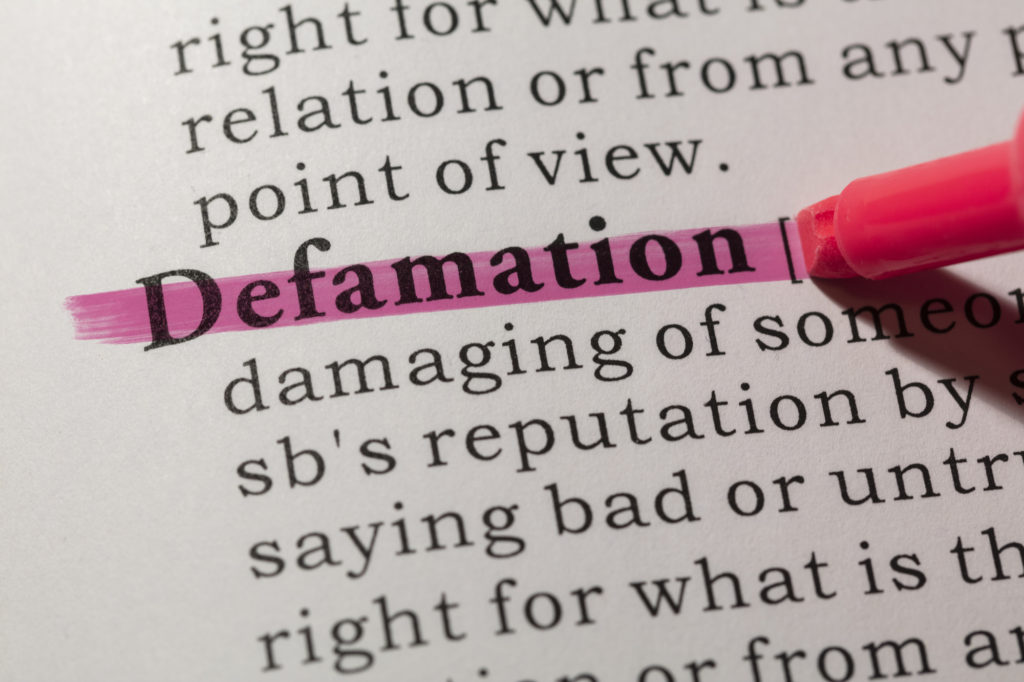

Defamation, also called slander or libel, is the act of destroying one’s reputation by spreading false statements. While it does not cause the kinds of physical injuries most often associated with personal injury, the person or entity who has intentionally spread falsehoods has caused damage and may be held responsible for their actions. Under defamation per se law, it must only be proven that anybody would or should know that the statements made would damage a reputation. In order to succeed in a defamation claim, intentional malice must be proven.

There are several types of defamation: libel (defined as defamation using writing) and slander (spoken defamation). A specific defamation case can be based on any number of factors including one’s social status, education level, career path/standing, sexual orientation, etc. Whereas defamation per se is defamation that should be obvious to anyone who hears or reads the defamation statement, defamation per quod requires proving special damages in order to recover for emotional harm.
The elements of defamation are: (1) a false and defamatory statement concerning another; (2) an unprivileged publication to a third party; (3) fault amounting at least to negligence on the part of the publisher; and (4) either actionability of the statement irrespective of special harm or the existence of special harm caused by the publication.
Categories under defamation include libel, slander per se, slander per quod, and defamation in advertising. Slander per se denotes verbal defamation, such as defamation in the form of slander, that is actionable without any proof of special harm. Slander per quod denotes allegations that would otherwise be actionable as libel (written defamation), and cannot be made on such basis unless special damage is first shown.
Under defamation law, a plaintiff must prove: (1) the defendant published a false statement; (2) about the plaintiff; (3) which creates negative, imputed facts about him/her; and (4) these facts injured his/her reputation or caused other real losses. The plaintiff may prove this by establishing some type of track record showing their qualifications or reliability as an expert authority on the subject matter at hand, such as testimony from other experts who have had success following the plaintiff’s advice.
Similarly, defamation law requires that a defendant has published statements about another person, which is defamation per se if the statements would harm the other person’s reputation or expose him/her to public hatred or contempt. If this requirement is met, it will be presumed that the defamation caused damage to the subject’s business interests and/or to his/her personal character and standing in society; thus, compensation may be recovered without proof of actual loss (although such loss must be proven). The court can choose not to compensate for defamation per quod, since it could encourage defamation.
Defamation should be obvious to anyone who hears or reads the defamation statement, whereas defamation per quod requires proving special damages in order to recover for emotional harm. In defamation law, a plaintiff must prove: 1) defamatory remarks that are false; 2) defamation in the form of slander rather than libel because it was spoken defamation, 3) defamation causes harm by exposing a person to hatred or contempt, and 4) it is at least negligent on the part of the publisher.
On May 24, 2018, the Supreme Court decided “National Institute of Family and Life Advocates v. Becerra”, in which it held that pro-life crisis pregnancy centers cannot be prevented from fully informing women about their unavailability for state-sponsored contraceptive care and abortions because doing so would violate the First Amendment’s protections for free speech. The case was brought by the National Institute of Family and Life Advocates (NIFLA), an anti-abortion nonprofit representing 111 c/p centers in California, challenging a 2015 law requiring them to post notices regarding the availability of contraception and abortion services provided by the state. In a 5-4 vote along ideological lines, the Court held that the law’s requirements constitute compelled speech and are therefore in violation of the First Amendment. The ruling was praised by NIFLA, but criticized by Planned Parenthood Federation of America, which said the decision will affect “more than 25 states with similar laws”.
On January 11, 2018, President Trump tweeted that he would be involved in defamation lawsuits against BuzzFeed for publishing Russian-related allegations made in the Steele dossier about him. It is also rumored he is considering defamation claims against former FBI Director James Comey over his congressional testimony where he accused Trump of asking him to drop an investigation into former National Security Advisor Michael Flynn. Trump has denied ever speaking to Comey about this matter. His wife Melania had reportedly settled defamation claims against U.S. blogger Webster Tarpley after he posted unsubstantiated rumors that she may have worked for an escort service.
The following defamation cases are some of the most notable in United States history: “New York Times Co. v. Sullivan” (1964), “Gertz v. Welch, Inc.” (1974), “Falwell v. Flynt” (1987), “Celotex Corp. v. Catrett” (1986).
Defamation that cannot be denied because facts are clear and undisputed, such as defamation of character or defamation of occupation/business; this might require special damages, but if defamation per se does not, the plaintiff can win by proving the statement was harmful and damages only need to be proven according to state law (in some states, up to $75,000 for an emotional injury like any other personal injury claim).
If you think you may have a defamation case, it’s important to contact an experienced defamation attorney as soon as possible. Burwell Nebout has successfully represented clients in many defamation cases and can help you understand your legal rights and options. Don’t let someone else damage your reputation – contact us by phone at (281) 645-5000 or request a free consultation online.